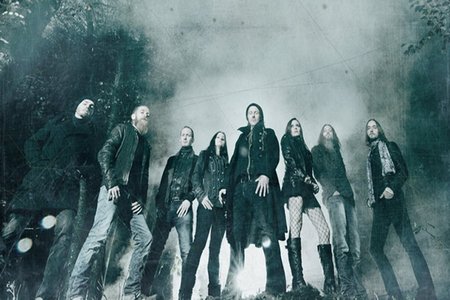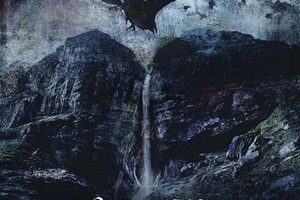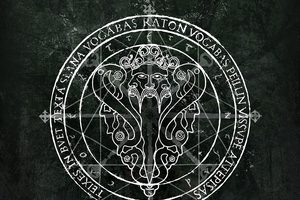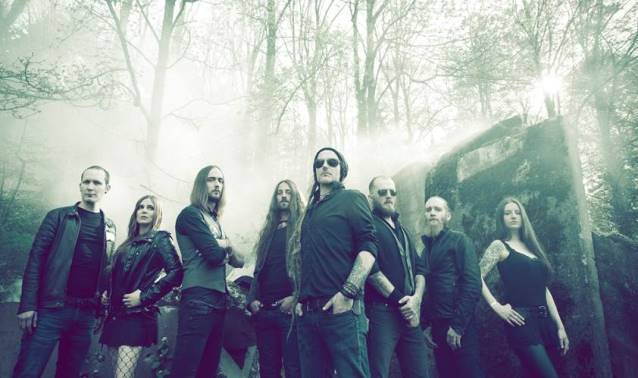Eluveitie – Exploring Origins
Monday, 25th August 2014
One of the longest standing and revered of the current folk metal genre, Eluveitie has stayed the course for over 12 years now. Taking a solid melodic death metal backbone and adding in traditional Celtic/folk instruments, such as the hurdygurdy, has always been the base of Eluveitie’s sound. They have brought in more instrumentation and experimentation over the years, but the core of the band has remained the same. Helvetios saw the band attempt a concept album, and for their most recent release, Origins, the band has loosened the reins a bit, but still keeping things with a common focus.
Origins also sees Eluveitie streamlining and further enhancing their sound. Surely, if you have enjoyed their last few albums you will find something to enjoy with Origins. With the release of Origins, we were able to contact hurdygurdy/flute/vocalist Anna Murphy via email to hear her thoughts on the new album, how the band has changed over the years, and even her own solo career.
Dead Rhetoric: With Eluveitie being one of the forerunners and innovators of the folk metal genre, is there always a need to up the ante, so to speak, with each release?
Anna Murphy: I don’t think we feel the need to do so, but it just happens anyways. There’s bands that always stick to the same formula or ones that like to keep it minimalistic. But those things just wouldn’t fit to us, we’d rather see what else we could add and/or change with a new album.
Dead Rhetoric: Your first recording with Eluveitie was 2008’s Slania. How do you feel the band has changed over the years since you’ve joined?
Murphy: From a musical point of view: We added more and more. On Slania we were happy to work with the instruments we have. You’d have either one or two folk instruments playing a tune, the others doing an accompanying melody and at the most additional guitar leads or self-made choirs. Now we have orchestration, real choirs, sometimes up to 4 different violin tracks at the same time, etc… It’s just become more complex and elaborate. Having more time and budget also adds hugely to why we do more than we did in the past of course.
From a “personal” point of view: We’ve become more professional and calmed down a lot. This is good and bad in a way. We used to go out after every rehearsal and drink, have fun, talk about all sorts of crap. Now we’re kind of all happy as soon as we can go home and do something that isn’t band-related because we see each other all the time anyways.
On tour we take care of ourselves more than we used to, because we realized that it’s more important to be fit on stage for your fans, rather than experiencing tour-madness 24/7.
Dead Rhetoric: Origins is a bit of a concept album, following up from what you did with Helvetios. Could you describe a bit of what Origins deals with?
Murphy: The album deals with Celtic origins. Pretty much all cultures have origin myths and tales. Either about how the culture itself came to be or myths about how the whole world was created. Unfortunately there is not a lot of information left to us about the Celts beliefs and mythology because they hardly wrote anything down. But Chrigel worked hard researching and again worked together with scientists. I guess you could call the album a kind of concept album as well, not in the same sense as Helvetios, because that was chronological and completely intended with a concept. But still, on Origins somehow all the songs are connected as well.
Dead Rhetoric: It’s been noted that Eluveitie does some research with scientists/scholars before recording an album. How extensive is that process?
Murphy: Judging on how “available” Chrigel is during those times, VERY extensive! We’re always wondering if he’s still alive…
Dead Rhetoric: How important is it to Eluveitie that your Gaulish language usage and historical information be as accurate as possible? Does it every feel as though it’s your duty to make sure things are portrayed to the best extent possible?
Murphy: It’s very important, especially to Chrigel since he’s kind of the “mastermind”. And I can fully understand this. Once you decide that you want to be creative, but still stick to historical accuracy, you have to work for it. I think that’s what makes Eluveitie special in a way, we’re not like other bands in our genre who are very spiritual, we want to give small history lessons along with our music.
Dead Rhetoric: On your Facebook page, the cover photo currently states, “I know where I come from. I know who I am.” How does this statement pertain to Origins?
Murphy: My interpretation from the sentence is knowing better who you are, if you have dealt with your origin. Knowing where you come from is knowing your origin. And having the interest to search within your roots and learning things about your culture, brings you closer to who you are.
Dead Rhetoric: How was the decision made to create several different language versions of “The Call of the Mountains?”
Murphy: I think Chrigel had the idea, and I was then asked if I feel up for the challenge. And I did, I think it was a great idea! I don’t think any band has ever released one song in all the national languages of Switzerland.
Dead Rhetoric: It seems it’s a bit of a tradition that there are a few songs on each album that you sing lead. Are these planned for or does it just come about naturally over the course of writing an album?
Murphy: It’s like you say, a tradition. There was a female song on each album already before I joined. So when I joined Chrigel asked if I would be interested in “carrying on” this tradition which I did with “Slanias Song”. It has increased on the latest albums, because I’ve worked a lot on my vocals and also really enjoy singing now. I never asked to have more parts, but I guess Chrigel also enjoyed my work and we especially wanted to do more songs where the both of us sing together.
Dead Rhetoric: You’ve been able to find some success outside of Eluveitie on your own, even releasing a solo album last year. Are you beginning to see a portion of your fan base that isn’t initially getting to know you through Eluveitie?
Murphy: To be honest, not that much. I still think most of my fans and also the ones coming to my solo shows are Eluveitie fans. This is not a bad thing at all, I think it’s great how open they are to my music (which is completely different to folk metal!) and I’ll always be grateful for their support. But I also would very much like to see what people who have never heard of Eluveitie think about my music. So far there hasn’t been that much feedback from “non Eluveitie listeners”.
Dead Rhetoric: With the possibilities that you could cross-over outside of the metal scene, what is it about heavy metal that draws you in?
Murphy: The authenticity of it. It’s about having fun, playing music for your supporting fans. And I don’t think any other music genre has such faithful fans as in metal. They show up to your shows, they wear your T-shirt with pride, and they’ll listen to you for quite a while, not caring for any new trends that should avert their attention from you.
Metal fans make it possible that we can tour the world every year! And that’s awesome.
Dead Rhetoric: Are there any plans to follow up the acoustic Evocation I at this time?
Murphy: Not any concrete plans yet, but we will definitely write a follow-up!
Dead Rhetoric: You will be on tour with Tyr and Metsatoll soon in the US, are there any tracks off of Origins that you are looking forward to playing?
Murphy: I’m really looking forward to playing “Inception” and “Vianna”.


























